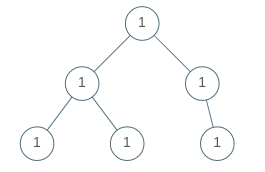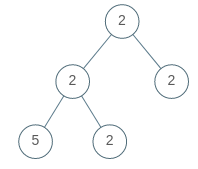A binary tree is univalued if every node in the tree has the same value.
Return true if and only if the given tree is univalued.
Example 1:

Input: [1,1,1,1,1,null,1]
Output: true
Example 2:

Input: [2,2,2,5,2]
Output: false
Note:
- The number of nodes in the given tree will be in the range
[1, 100]. - Each node's value will be an integer in the range
[0, 99].
题目描述:大概意思就是问我们给定一棵树,判断这棵树上的所有节点的值是不是相同的,相同即为 true ,不相同为 false 。
题目分析:判断一棵树的所有节点的值是不是相同的,可以分为以下几个条件:
- 节点是否为空
- 左子节点和父节点是否相同
- 右子节点和父节点是否相同
- 左子节点和右子节点是否相同
根据这个思路我们可以解决这个问题。
python 代码:
# Definition for a binary tree node.
# class TreeNode(object):
# def __init__(self, x):
# self.val = x
# self.left = None
# self.right = None
class Solution(object):
def isUnivalTree(self, root):
"""
:type root: TreeNode
:rtype: bool
"""
left_correct = not root.left or root.val == root.left.val and self.isUnivalTree(root.left)
right_correct = not root.right or root.val == root.right.val and self.isUnivalTree(root.right)
return left_correct and right_correct
C++ 代码:
/**
* Definition for a binary tree node.
* struct TreeNode {
* int val;
* TreeNode *left;
* TreeNode *right;
* TreeNode(int x) : val(x), left(NULL), right(NULL) {}
* };
*/
class Solution {
public:
int temp;
bool flag = true;
bool isUnivalTree(TreeNode* root) {
if(!root){
return true;
}
temp = root->val;
travelTree(root);
return flag;
}
void travelTree(TreeNode* root){
if(root){
travelTree(root->left);
travelTree(root->right);
if(flag){
flag = root->val == temp ? true : false;
}
}
}
};